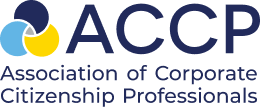ACCP Staff
How did you get your start in corporate citizenship?
Starting with a summer internship dedicated to fostering relationships within the Latino community, I successfully transitioned into a public relations role supporting The Coca-Cola Foundation. In 2008, I joined the foundation’s team full-time.
The field continues to evolve. What are the most critical skills and knowledge corporate social impact professionals need to be successful?
Ten skills every CSR professional needs to be successful:
- Strategic Planning: Impact professionals should be proficient in strategic planning to design and manage programs that tackle the social issues their corporations aim to address.
- Stakeholder Engagement: Successful professionals will have strong skills in stakeholder engagement, which involves building relationships with stakeholders like employees, customers, community members, and others.
- Knowledge of Sustainability and Corporate Social Responsibility (CSR): A deep understanding of sustainability issues, CSR practices, and international standards is essential.
- Measurement and Evaluation: Professionals in this field must be skilled in monitoring and evaluation methods to measure the impact of the social initiatives undertaken.
- Communication Skills: Successful corporate social impact professionals need excellent communication and storytelling skills to convey the impact and value of the company’s CSR efforts to various stakeholders.
- Understanding Business Functions: They should have a solid understanding of how different departments work and how they can contribute to the organization’s social impact goals.
- Change Management and Advocacy: Professionals should be resilient and capable of managing change, advocating for new strategies, and influencing decision-makers on the importance of social impact.
- Legal Knowledge: A basic understanding of a company’s legal responsibilities and regulations relevant to CSR can help professionals make informed decisions about their strategies.
- Ethical Reasoning: Dealing with social impact and responsibility matters often involves complex ethical considerations. Professionals in this field need the ability to navigate these complexities and make decisions that align with their company’s values and societal expectations.
- Collaboration and Teamwork: Professionals must work cooperatively with different departments and external partners to accomplish their social impact goals, so strong teamwork skills are essential.
What is one specific piece of advice you received that has served you well in your professional journey?
“Never stop learning.” Regardless of your career stage, there is always new knowledge to be gained, skills to be improved, and perspectives to consider. This lifelong learning approach not only enhances professional competence but also helps foster innovation, adaptation to change, and personal growth.
Considering the current landscape corporate social impact professionals are working in, what are the essential things you suggest for them to make a priority?
Two things stand out for me:
1. Now more than ever, impact matters. We must strive to support efforts that make measurable, positive impact in the communities we serve.
2. Leverage Artificial Intelligence (AI) to improve our work. We are just starting to unlock how to use this powerful tool to identify social issues, measure impact, anticipate future trends, support advocacy and awareness, and much more.
Who is someone you admire and why?
I admire my dad. He came to the United States at the age of 27 with a wife, two young sons, and a lack of English language skills. He worked hard, sacrificed, and eventually started his own business. He taught me many valuable lessons, including the importance of relationships, the value of perseverance, and, most importantly, integrity.

